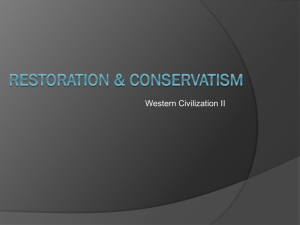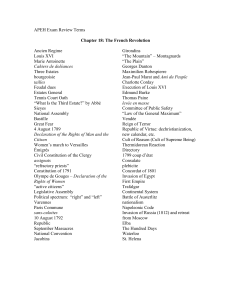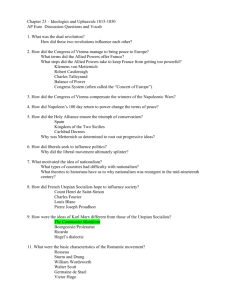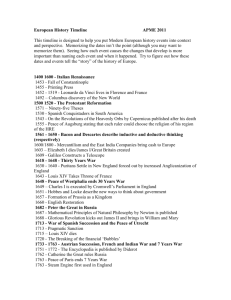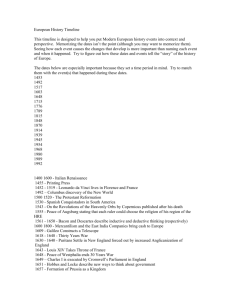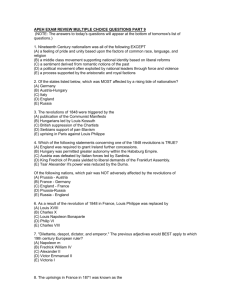File
advertisement
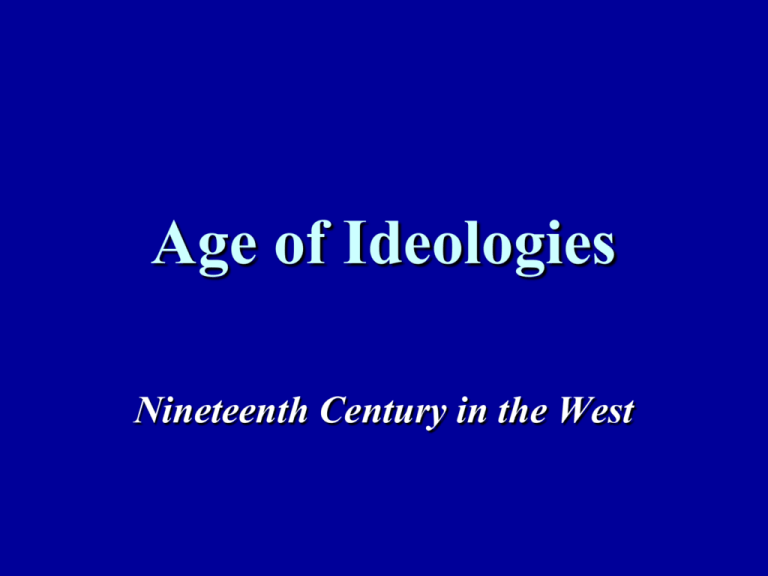
Age of Ideologies Nineteenth Century in the West Revolution of 1830 • Louis XVIII died in 1824, leaving his brother Charles X heir to the throne • Charles X was a firm believer in rule by divine right. • Historical mistakes lead to blood shed. Reactionary Policies • Gave land back to the emigres • Restored the primogeniture rule • Made Roman Catholicism the official and only religion of France • In 1827, denied the Chamber of Deputies constitutionality. The July Revolution • In 1830, the liberals won the majority vote for seats in the Chamber of Deputies • Charles attempted a royalist seizure of power. • Royalist victory in Algeria Four Ordinances 1. 2. 3. 4. July 25, 1830 Restricted freedom of the press Dissolved the recently elected Chamber of Deputies Restricted the franchise to the wealthiest people in France Call for new elections. Down goes Charles!!! • The royal army could not gain control of Paris. • On August 2, 1830 Charles abdicated and fled to England • The Chamber of Deputies named Louis Philippe “King of the French” Fit for a King? July Monarchy • The July Monarchy established under Louis Philippe was politically liberal • Socially, however, he was a conservative. • Money was the path to power, and the working class was downtrodden • A series of revolts broke out between 1832-1834. Les Miserables Belgium Becomes Independent • August 25, 1830 disturbances broke out in Brussels following the performance of Salvatore Rosa. • Belgium – Catholic and Dutch – Calvinist • A rebellion broke out and Belgium defeated the Dutch. • In 1831, Leopold of Saxe-Coburg was declared King of Belgians Toward an Industrial Society • Industrialization was one of the final steps in making Europe modern. • Great Britain led the charge for the Industrial Revolution. • Society becomes transformed. Great Britain • Industrialism started in Great Britain in 18th century. • By the turn of the century Britain had successful factories all over the world. • Textiles, ironmaking, shipbuilding, china production. Textile Inventions • 1733- John Kay invented the “fly shuttle” allowed one person to operate a loom. • 1765- James Hargreaves created the “spinning jenny”, which spun 16 spindles of thread at a time. • 1769 – Richard Arkwright applied waterpower to the spinning process. Proletariat • Proletariat meant the workers of the means of production. • Workers contribute their labor for a wage…no longer own the means to production. • The emergence of factories The Great Reform Bill • 1830 – George IV died and his brother William IV became king. • Whigs took control of Parliament and William insisted on coming to an agreement. • 1832 – Great Reform Bill increased the voting rights to all middle-class men. Political & Economic Reform • Commercial and industrial class was larger in Britain … prosperity required attention to economic interests. • Liberal Whig aristocrats regarded as the protectors of constitutional liberty. • Reaction to conservative policies, such as the Six Acts Take “ACT”ion • 1833 – Factory Act: limited hours that children under 9 could work. • 1838 – Anti-Corn League • 1842 – Mines Act: Forbade women and children to work as hurriers. • 1847 – Ten Hours Act: Work shifts were confined to 10 hours a day. A Bleak Time • “It is a melancholy truth that even great men have their poor relations.” • England was able to put off revolution because of the process of reformation. But what about the politicians? Factory owners? Economics • Classical Economics - Adam Smith • Laissez-Faire - “hands off” • Rise of the bourgeoisie - stable government - competition - industriousness Classical Economics – The Dismal Science: • The new working class created problems over population & wages • Thomas Malthus (1766-1834): Essay on the Principle of Population • David Ricardo (1772-1823): Principles of Political Economy Thomas Malthus • Need to contain population • Conditions could not be improved • Population must eventually outstrip the food supply. • Contraceptive or Higher standard of living David Ricardo • “Iron law of wages” • Raise wages = More children • Expanded market = Lower wages • Lower wages = Fewer children • Wages would always tend toward the minimum Utilitarianism • Nature has placed man between the two sovereign master of pain and pleasure • That which is ethical is that which promotes the greatest happiness of the greatest number. Socialism • Early socialist applauded the new productive industrialism. • Opposed the classical economists • Mismanagement, low wages, poor distribution of goods arose from unregulated industrial system Utopian Socialism • • • • Henri de Saint-Simon: 1760-1825 Robert Owen: 1771-1858 Charles Fourier: 1772-1837 Louis Blanc: 1811-1882 Marxism • 1818-1883 • German middle class family • University of Berlin • Communist Manifesto Communist Manifesto • Marx and Engels wrote the manifesto in 1848. • Communism implied the outright abolition of private property • Combination of German Hegelianism, French Socialism, and British classical economics. Marx’s Revolution • Revolution through class conflict • Bourgeoisie and Proletariat • Proletariat and Communist “All that is solid melts into air, all that is holy is profaned, and man is at last compelled to face with sober senses, his real conditions of life, and his relations with his kind.” 1848 Revolutions • Severe food shortages • Commercial and Industrial economy was depressed. • Unemployment & poor living conditions. • Discontent of the working classes France • Liberal opposition to the corrupt regime -> July Monarchy • February 23rd Guizot resigned, on February 24th Louis Philippe abdicated. National Assembly & Paris Workers • Alphonse de Lamartine (17901869) • Re-write a new constitution -> 2nd Republic • But workers wanted social revolution too! Rise & Fall of the Second Republic • Revolution heats up during June in Paris… “June Days” (Flaubert) • Social order & protection of property. • The election of “Little Napoleon” Déjà Vu ??? • Like 1795, France turned to a strong leader….Louis Napoleon. • With the popular vote Louis Napoleon becomes the President of the Republic Little Napoleon • December 2, 1851 seized power to call for a reelection. • December 2, 1852 declared the 2nd Empire • Napoleon III Habsburg Empire • The Habsburg Empire cut across national lines. • Nationalism was preached throughout the Empire. • 1848 rebellions broke out in Vienna, Prague, Hungary, and Italy. Louis Kossuth (1802-1894) • Magyar Nationalist • March 1848 made moving speeches at the Hungarian Diet • Independence of Hungary and a responsible gov’t. Vienna Uprising • Kossuth speeches influence student organizations … riots break out in Vienna. • Metternich resigned and fled the country • May 17, 1848 Ferdinand agreed to a moderately liberal constitution. • Hungarian Diet abolished serfdom. Magyar Revolt • The incident in Vienna encouraged Magyar leaders in Hungary. • Magyars wished to have a separate Hungarian state within the Habsburg domains. • Forcing Romanians, Serbs, & Croatians to abide by Magyar policy a revolt broke out! Czech Nationalism • At the same time of the Hungarian revolt, Czech nationalism also pique in the spring of 1848. • Czech nationalist demanded Bohemia and Moravia to be permitted to the Slavic state. • Pan-Slavic Congress called for Slavic recognition. Divide and Conquer • Gen. Alfred WindischGraetz • June 17, 1848 moved against the Czech Nationalists • Germans and Middle Classes approved • Radicals suppressed Rebellion in North Italy • March 18, 1848 in Milan a group of Italian Nationalists rebelled against the Habsburg rule in North Italy. • General Radetzky retreated, until July and quelled the rebellion. Habsburg Victory • Franz-Joseph takes over the Habsburg Empire • Supported by Tsar Nicholas I, the Habsburgs put down every revolt and returned order. Italy • The Italian Revolution was rooted in deep republican ideals. • Nationalists wanted a unified Italy • Rally under Pope Pius IX • Radicalism led to downfall for republican ideals. Republicanism Defeated • November 15, 1848 radicals assassinate the minister of the Papal States Count Rossi • Pius IX fled to Naples for refuge. • February 1849 declare the Roman Republic • Mazzini and Garibaldi Arrivederci!!! • In March 1849, radicals forced Piedmont to renew war with Austria. • Piedmont defeated and the new Republic was on its own. • June 1849, Napoleon III sends 10,000 troops to put down the radical rebellion • Pius IX renounces liberalism and returns Germany • 1848 brought liberalism to the forefront of German states. • Numerous states such as Wurttemberg, Saxony, Hanover, and Bavaria called for a liberal government and German unity. Revolution in Prussia • March 15, 1848 large popular disturbances had erupted in Berlin. • Frederick William IV called for an assembly to write a constitution. • Appointed a liberal minister to head the cabinet -> David Hansemann Frankfurt Parliament • May 18, 1848 representatives from all over Germany met in St. Paul’s Church. • Revise the organization of the German Confederation and write a constitution for all Germany. • Grossdeutsch vs. Kleindeutsch Solution The Frankfurt Flounder • Frederick William IV rejected the constitution because … 1. There was nothing legal or binding about the actions 2. Junker support was not interested in Germany unity 3. He feared opposition from Austria 4. He did not want “a crown picked up from the gutter.” Frederick William IV • By April 1849, a conservative ministry replaced the liberal one in the Assembly • Frederick William IV dissolved the Assembly and proclaimed its own constitution. Questions ??? • Why did the revolutions of 1848 fail throughout Europe? • What roles did liberals and nationalists play in the revolutions? • Why did they sometimes clash? • Idealism vs. Realism Flaubert Next Week • Compare and contrast the Italian and German unification movements in the late nineteenth century.
